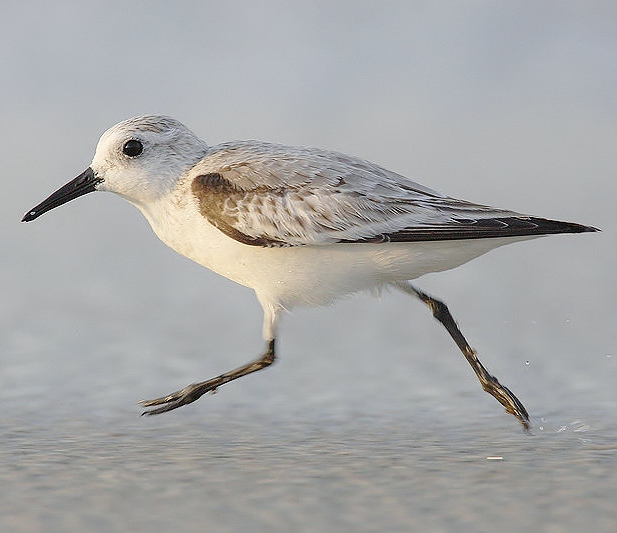 |
| (Photo from Wikipedia) |
Common name:
sanderling (en); pilrito-das-praias (pt); bécasseau sanderling (fr); correlimos tridáctilo (es); sanderling (de)
Taxonomy:
Order Charadriiformes
Family Scolopacidae
Range:
The sanderling breeds in the Arctic region, in northern Russia, northern Alaska, northern Canada and Greenland, migrating south to winter along the coastlines of all continents except Antarctica.
Size:
These birds are 18-22 cm long and have a wingspan of 35-45 cm. They weigh 40-100 g.
Habitat:
Sanderlings breed in the tundra, both in barren stony areas and in areas of sparse vegetation such as willows, sedges, heathers and saxifrage. Outside the breeding season they are mostly found in sandy beaches, but also in rocky intertidal areas, mudflats and lagoons.
Diet:
During the breeding season they mainly eat insects, such as craneflies, midges and mosquitoes, and also some spiders, crustaceans and even plant materials. Outside the breeding season they feed on small crustaceans, bivalves, polychaete worms and some insects.
Breeding:
Sanderlings breed in June-August. The mating system is very flexible, varying from monogamy to serial polygyny, polyandry and polygynandry. The nest is a scrape on the ground in an open area, sometimes lined with leaves and lichens. There the female lays 4 greenish eggs with brown spots, which are incubated for 23-32 days. The chicks leave the nest soon after hatching and are lead by one of the parents for a few weeks. They fledge 12-14 days after hatching and become independent 1 week later. Females may lay a second clutch while the male takes care of the chicks from her first clutch. Sanderlings reach sexual maturity at 2 years of age.
Conservation:
IUCN status – LC (Least Concern)
This species has a very large breeding range and the global population is estimated at 620.000-700.000 individuals. The overall population trend is uncertain, as some populations are decreasing, while others are increasing, stable or have unknown trends.







